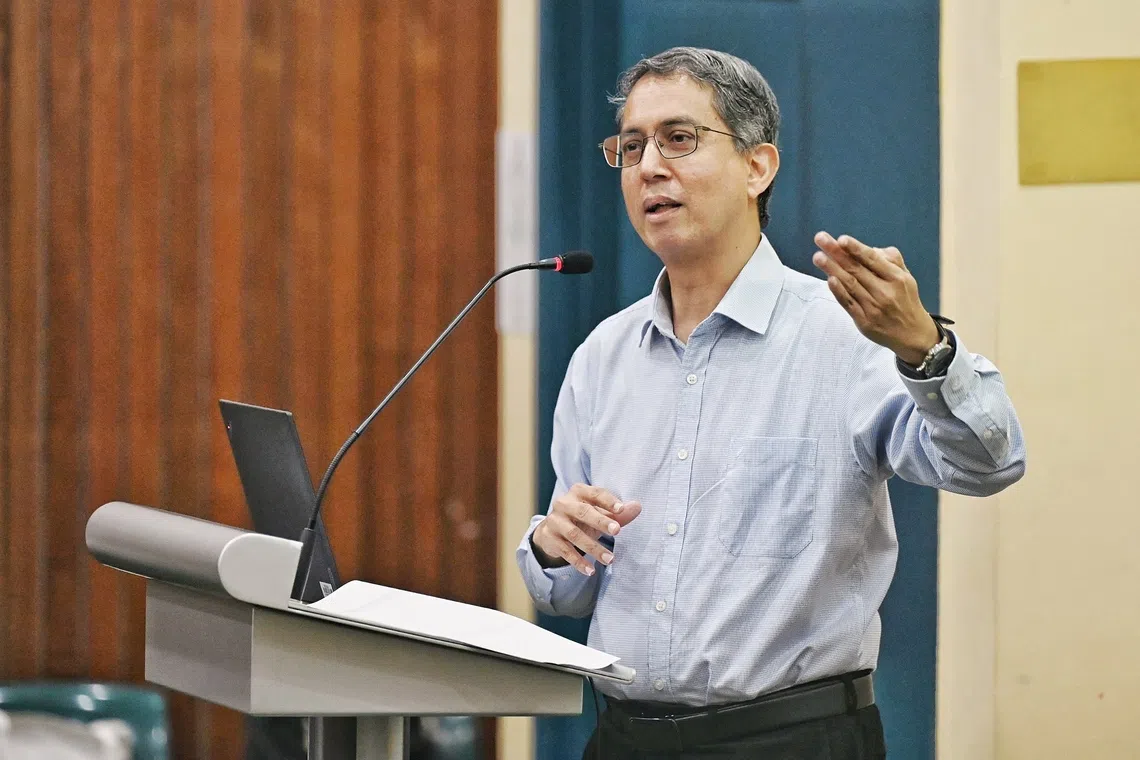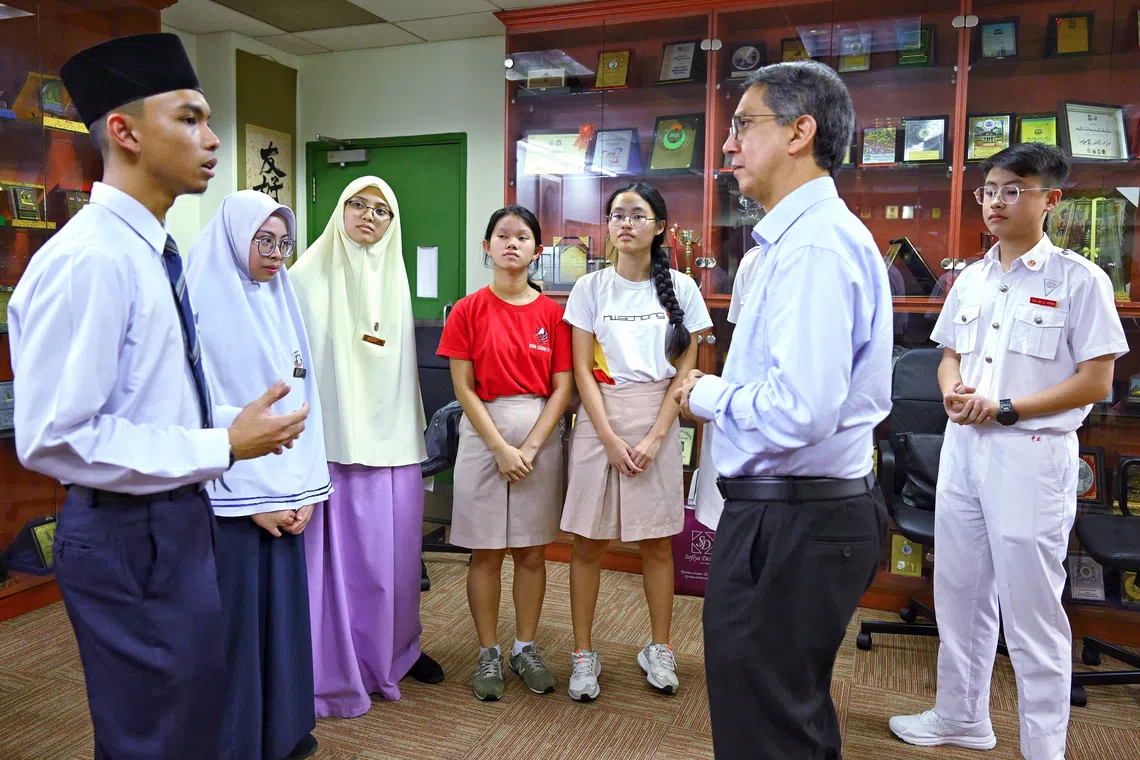Faishal Ibrahim warns about AI-fuelled radicalisation, raises need to empower youth to counter risks
Sign up now: Get ST's newsletters delivered to your inbox

Acting Minister-in-charge of Muslim Affairs Faishal Ibrahim said AI has featured in several youth self-radicalisation cases here.
PHOTO: BERITA HARIAN
Follow topic:
- Singapore is concerned about the trend of younger individuals being radicalised under the ISA, with over a dozen cases since 2015, said Associate Professor Faishal Ibrahim.
- Extremist groups are using AI to create persuasive propaganda, impersonate trusted voices and amplify radical content, making it harder for young people to discern truth, he noted.
- Singapore must empower its youth with digital literacy and critical thinking, harnessing AI for good while being mindful of its risks, amid growing global and local conflicts.
AI generated
SINGAPORE – The trend of detainees under the Internal Security Act (ISA) getting younger in recent years is deeply concerning, Acting Minister-in-charge of Muslim Affairs Faishal Ibrahim said on Nov 17.
Meanwhile, extremist groups now use artificial intelligence (AI) to create persuasive propaganda, and to even impersonate trusted voices. This use of technology can amplify the reach and sophistication of radical content, while making it more difficult for young minds to distinguish truth from manipulation, added Associate Professor Faishal, who is also Senior Minister of State for Home Affairs.
Not surprisingly, AI has also featured in several youth self-radicalisation cases here, Prof Faishal told some 160 students at the 8th Madrasah Seminar, a biennial event supported by the Ministry of Home Affairs and the Islamic Religious Council of Singapore.
For instance, a 17-year-old youth arrested in August 2024
The youth was arrested just weeks before he could carry out his plan to kill non-Muslims in Tampines. He had planned to release his AI-generated declaration prior to his attack, in the hope of inspiring other Muslims to engage in armed violence.
In a more recent case, another 17-year-old teen,
In these cases, the security services had acted just in time to prevent profound tragedy, Prof Faishal said. “These are not distant stories. These are our own young people, often bright and caring, who became radicalised after exposure to extremist content online.”
Since 2015, there have been more than a dozen self-radicalised Singaporeans under the age of 21 issued with orders under the ISA. This highlights the “escalation” of online radicalisation, and this challenge must now be met with even greater awareness, technical skill and collaboration, said Prof Faishal.
“These cases remind us of the critical need for resilience, awareness and early intervention,” he said. “We intervene not to sabotage the youth’s future, but to bring them back to the mainstream and save them from harming themselves and others.”
While the city-state has remained safe amid an increasingly complex global environment, threats of terrorism, radical and divisive ideologies remain very real, and it is increasingly in the digital space that influences can spread quickly and silently, added Prof Faishal.
Singapore is not immune to the violent ideologies promoted by extremist groups, as shown by the youth radicalisation cases here, he said.
Foreign conflicts such as the Russia-Ukraine war and Israel-Hamas conflict have also profoundly impacted lives and worldviews here, and exposed Singaporeans to an unprecedented level of violence, displacement and human rights abuses, he noted.
In particular, the prolonged Israel-Hamas conflict has created strong sentiments and incidents here that could undermine the city-state’s social cohesion, and Prof Faishal urged Singaporeans to never allow foreign conflicts to harm the hard-earned trust and harmony among its various communities.
In this climate, Singapore must empower its youth with digital literacy and critical thinking. Pointing to short videos the students produced as part of the 8th Madrasah Seminar to foster responsible content creation online, he said these showed that technology such as AI can be harnessed for good, while being mindful of its risks.
The seminar was organised by Madrasah Aljunied Al-Islamiah and Madrasah Wak Tanjong, and it brought their students together with those from Madrasah Al-Maarif, Madrasah Al-Arabiah, Madrasah Alsagoff and other schools such as Dunman High School, Chung Cheng High School and Hwa Chong Institution.

Acting Minister-in-charge of Muslim Affairs Faishal Ibrahim with students who attended the 8th Madrasah Seminar on Nov 17.
PHOTO: BERITA HARIAN
Madrasah Aljunied Al-Islamiah student Ahmad Eimran Darwisy Mohammad Suhaimi, 18, said he uses AI daily to help in his research and group projects as he takes the International Baccalaureate.
The seminar helped him gain a better understanding of how technology and AI can be used not only for division, but also for good, he said.
“AI isn’t something we can run away from – it is evolving and is quite inevitable,” he said. “So, we should take it to our advantage, and use it to contribute to the community instead of exacerbating issues like radicalism.”
For Hwa Chong Institution student Djie Atria, 17, the seminar was also an opportunity to gain a deeper understanding of how other communities live.
Atria, who is Chinese, said that before the seminar, she had a general understanding of different racial and religious groups here.
“I gained a deeper appreciation for challenges like Islamophobia, or the fears of being misrepresented or their faith being distorted by various extremist groups to serve their needs,” she said.
“(The seminar) gave me a much better and balanced understanding of the issues, and was an enriching experience.”


